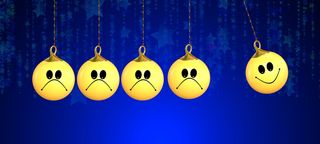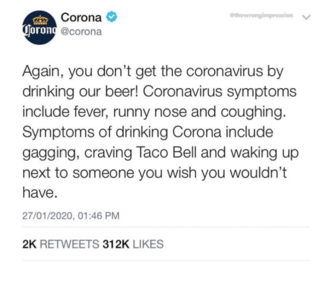Humor
Why Do People Laugh During a Crisis? The Philosophy of Humor
Part One: Examining the role of laughter during difficult times.
Posted March 23, 2020

"The restoration of humor is one clear mark that a person is getting healthy because I think ... finding something funny means being able to distance yourself ... being able to manipulate ... being able to think about things in multiple ways, which really is the core of a healthy, well-lived human life." —Dr. Steven Gimbel, philosophy of humor expert
The Pandemic of 2020
The first quarter of 2020 will go down in history as the period of time when the COVID-19 pandemic dominated people's lives. Sporting events, fitness centers, high school proms, international conferences, schools, universities, restaurants and bars, entertainment venues, and many other businesses deemed "non-essential" were forced to close per state government orders, including shelter-in-place orders and stay-at-home-orders. People have been asked to honor social-distancing practices to help flatten the curve and slow down the spread of the highly communicable virus. Our world's doctors, nurses, first responders, sanitation workers, and essential food service workers have been asked to continue serving our communities.

It is an understatement to say that we are in a brand new world filled with uncertainties, fear, and a medical crisis. Our very way of living has changed rapidly, and we do not have the answers we want. People are struggling to understand COVID-19, also known as the coronavirus, and there seems to be two dominant voices of online communication: One has been called alarmist (constant posting about the dangers of the current situation), and the other has been called careless (an "it can't happen to me" mentality).
Whenever there is an extreme dichotomy like this, there is also a happy medium with which people can begin to understand the scary nature of what we are facing. I am not here to spring a debate about whether or not we are in crisis—it is clear that we are. I believe that people must learn how to sort through internet junk and learn which sources are non-biased and factual. Many people write posts about what they are feeling and include their own values-spin into their words. It is OK to share your ideas; it is not OK to spread fake news and fear.
It is vital for people to turn to reputable resources, including the World Health Organization and the Centers for Disease Control, to receive up-to-date and accurate information about the state of the health crisis in your country and in your community.

Jokes About Coronavirus
In writing about humor, by no way am I making light of the current situation. Instead, I am taking this opportunity to hold space for a discussion about why people crack jokes during serious and what sometimes seems to be inappropriate times.
Like any global story, COVID-19 became widely known, and the term "coronavirus" became part of our daily vocabulary. Questions about how the virus spread began to arise and people asked questions about the link between the virus and Corona beer. Some of the first posts to go viral were from the beverage company who produces Corona and reminded people on Twitter:
"Again, you don't get the coronavirus by drinking our beer ... Symptoms of drinking Corona include gagging, craving Taco Bell ..."
Corona, like many other large companies, chose to use humor to address an issue that could have (and has had) a negative impact on their brand.

Some people think this was in bad taste, and others appreciated the clever puns aimed at people mistaking their beer as a way to become exposed to the virus. This crisis, however, is no laughing matter. As soon as the seriousness of the virus became clear, Corona quickly changed their tweets, and as of this writing, the tweet shown above has been removed.
Why is it OK to crack jokes at times and not OK at other times? I, like most people, enjoy hearing funny jokes, and I love laughing. I can even poke fun at myself and have done so several times when public speaking. I'll say something funny (at least, I think it's funny) and the audience will either laugh or not laugh. I'm fine with either because I know my sense of humor is cheesy, and that's fine by me.
I will sometimes turn to laughter or sarcasm in stressful times because laughing makes me happy. It's by no means a sense of escape or way to make light of a serious situation—rather, it is a way to communicate with people about shared values and bring lightness into a difficult time.
Social distancing and shelter-in-place orders have resulted in people remaining home and indoors. Because a lot of my work is remote, I am used to creating a productivity schedule, but this intensity of isolation is hard for even me. One thing I find helpful is listening to audiobooks, music, and podcasts. To decrease the sense of being alone, I turned to Spotify and listened to some of my favorite podcasts.

The Philosophy of Humor
One podcast that caught my attention is The Thoughtful Counselor, Episode 161: The Philosophy of Humor, Theories of Ridiculousness with Steven Gimbel and Alfredo Palacious (a collaboration with Theory of Change podcast). This episode was particularly interesting to me, given the attempts at humor I have read online lately.
This episode featured Dr. Gimbel, a philosophy professor who specializes in the philosophy of humor, and Dr. Palacious, an assistant professor of counseling. Some people might think that listening to two professors talk about philosophy and counseling might be hard to follow, but this episode was easy to follow, conversational, and informative. I encourage you to take a listen and reflect on how you use humor in your own life.
Dr. Gimbel made several important points when discussing humor:
"When you share a joke with someone, there is a sense of connectedness. This was called joke intimacy by Professor Ted Cohen. This type of intimacy can be shared with someone you know or with a stranger. For instance, if you see something funny, you might look around to see if anyone else noticed—you might lock eyes with a stranger, and you both giggle. You've developed joke intimacy through a shared experience of laughter." Dr. Gimbel explained, "There is a sort of bond there, that happens with humor, which builds a sense of human community."
- Jokes are funny because they are based on a sense of common background, experiences, values, and shared belief structure. We see examples of common background jokes on shows like The Big Bang Theory when Sheldon tells physics jokes that are not funny to people without physics backgrounds (lack of shared background and experience).
- There is a neurobiological aspect of humor. Laughing brings joy and pleasure, which is associated with thoughts (cognitive) and feelings (emotional). When people make us laugh, we can develop a bond based on the joyful thoughts and feelings associated with that person.
- It is important to know the difference between joking and bullying. For example, bullying includes racial jokes and superiority jokes. This is about laughing at someone, at that person's expense, as opposed to laughing with someone.
- What you find funny could say something about your coping strategies. Laughing and humor are a direct reflection of our values, and sometimes humor serves as a coping mechanism.
- Laughing, according to Professor Robert Provine, is "incredibly contagious." Sharing laughter with people is one way to bring joy into difficult situations.
Please see Part 2, "Why Do People Laugh During a Crisis? The Role of Humor," to learn about theories of humor; linking humor, counseling, and COVID-19; and my conclusion.
References
Centers for Disease Control (2020, March 21). Coronavirus. https://www.cdc.gov/coronavirus/2019-ncov/index.html
Corona. (n.d.) @corona. https://twitter.com/corona
Degeneres, E. (n.d.). @Theellenshow. https://twitter.com/TheEllenShow
Palacios, A. (Host). (2019, Dec. - 2020, March). Theory of change [Audio of podcast]. https://podcasts.apple.com/us/podcast/the-theory-of-change-podcast/id14…
Palo Alto University (2019, Jan. 23). The thoughtful counselor. https://thethoughtfulcounselor.com
Shook, M. (Host). (2020, March 11). The Philosophy of Humor – Theories of Comedy and Ridiculousness with Steven Gimbel and Alfredo Palacios (No. 161) [Audio podcast episode]. In The thoughtful counselor. Source. URL https://thethoughtfulcounselor.com/2020/03/ep161-the-philosophy-of-humo…
Stanford. (2016). Philosophy of Humor. Stanford Encyclopedia of Philosophy. https://plato.stanford.edu/entries/humor/#SupThe
World Health Organization. (2020). Coronavirus. https://www.who.int/health-topics/coronavirus#tab=tab_1
Zamran. (2017, April 14). The Big Bang Theory - physics jokes [video file]. Retrieved from https://www.youtube.com/watch?v=F6LIo-FfpKs




